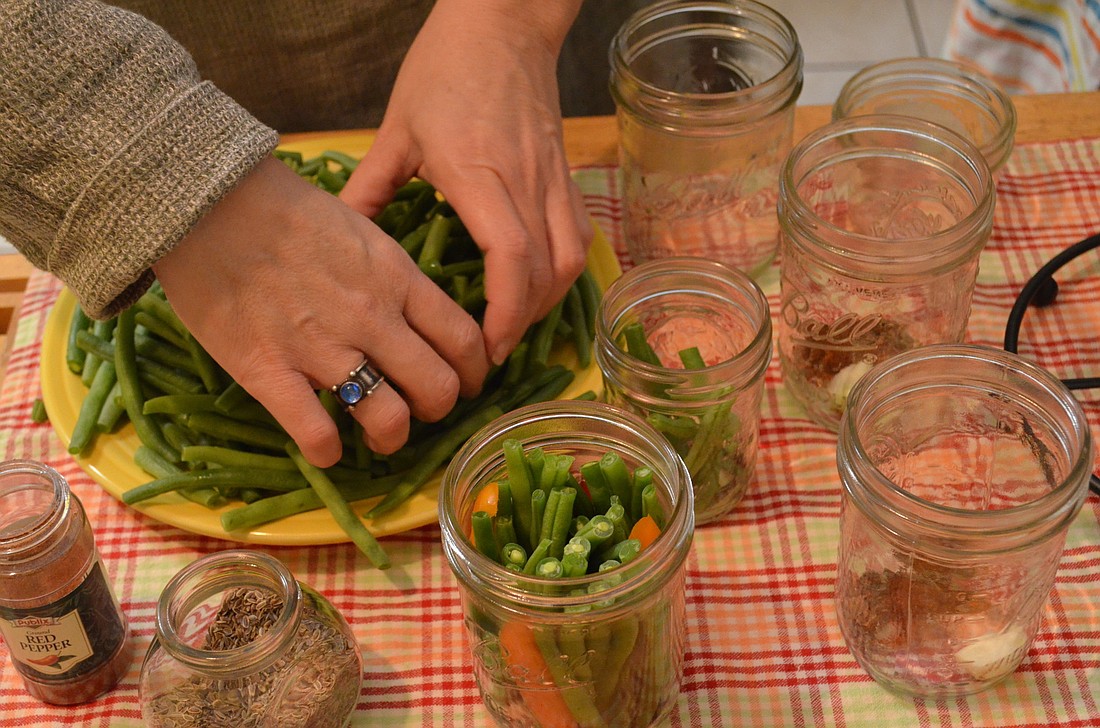- November 25, 2024
-
-
Loading

Loading

Lisa Fulk says strawberries were her gateway drug. The Cornell University-certified master food preserver had a surplus of strawberries following a strawberry-picking trip with her children. So, she learned to make jam.
Her interest has turned her into a full-fledged canning and preserving professional. Fulk runs a business, Sunshine Canning, from her Bradenton residence, where she and her husband also keep chickens, two rabbits and a well-kept vegetable garden. She’s the only master canner in this area and leads pickling, pressure canning and jam making at places such as Geraldson Community Farm, in Bradenton, and Jessica’s Organic Farmstand. She also teaches private classes.
At first glance, the faint smell of vinegar (a smell her children hate) is the only clue in Fulk’s house that she is a canner. But upon investigation, you learn she has cans hidden everywhere — including underneath her queen-sized bed and strategically hidden in shelves in her dining room. In addition, her garage stores loads of supplies for her culinary craft. She’s set for an apocalyptic crisis with everything from traditional dill pickle spears to vanilla-spiced pears, and beets pickled in red wine to chicken stock.
The pickling started when she was a little girl, and she pickled a little with her grandma, Helene McHale, who had an acre-sized garden. Although, her grandma probably didn’t listen to rap and hard rock while pickled like her granddaughter does. Fulk finds that in her classes, there are a lot of people with stories about pickling with their grandparents.
“Pickling skipped a generation,” Fulk says. “So there are people that want to do it again, but maybe there’s not someone around to teach them.”
She thinks there’s a general trend of people wanting to lead a more simple life, eat more local food and know their farmers. By default, that’s led to an increased interest in pickling, preserving and fermentation. The trend has found its way to menus in Sarasota — Indigenous offers pickled peppers and State Street Eating House tops its burgers with pickled onions, to name a couple. Fulk says her classes typically sell out, and she has a diverse variety of students ranging from hip localvores to seniors hoping to brush up on their skills.
She says it’s best not to trust any old recipe or process you find online because of the dangers of botulism, which can kill you. It’s important to understand the science and safety, which is what she teaches. Even if grandma has always processed her pickles in the dishwasher or oven and has never had a problem — it’s not safe.
“Grandma doesn’t like hearing she isn’t right,” Fulk says with a laugh.
But, it’s true. Without using suggested methods, such as boiling the cans in water, there are hot and cold pockets and its unknown if the cans have reached the right temperature for the right amount of time during the processing step. And that’s just one of the safety considerations. Fulk recommends downloading the free “USDA Complete Guide to Home Canning” online to get safe-tested recipes. Or, you can try her simple recipe for pickled green beans (below).
For the most part, pickling is easy. Plus, there are plenty of pickling perks. Fulk says it’s convenient. She can open up a can of pressure-canned meat for tacos and have a side of canned glazed pickles for a quick and easy dinner for her children. She also says that in Florida, where there’s not much of a harvest in the summer time, you can pickle vegetables in the fall and winter when they are in season, at the cheapest prices and have them year round. And, she says, they taste better canned at home than store-bought cans loaded with preservatives. The stores don’t carry the options Fulk creates. She likes trying interesting flavor combinations (for instance, she just pickled a jar of carrots, daikon radish and jicama). You can pickle any fruit and vegetable.
Plus, she says: “It’s fun! Pickling is just interesting.”
IF YOU GO
Canning 101: Strawberry Jam
When: 10:30 a.m. Sunday, April 6
Where: Crowley Museum and Nature Center, 16405 Myakka Road
Cost: $25
Info: Call 322-1000 or visit Sunshinecanning.com